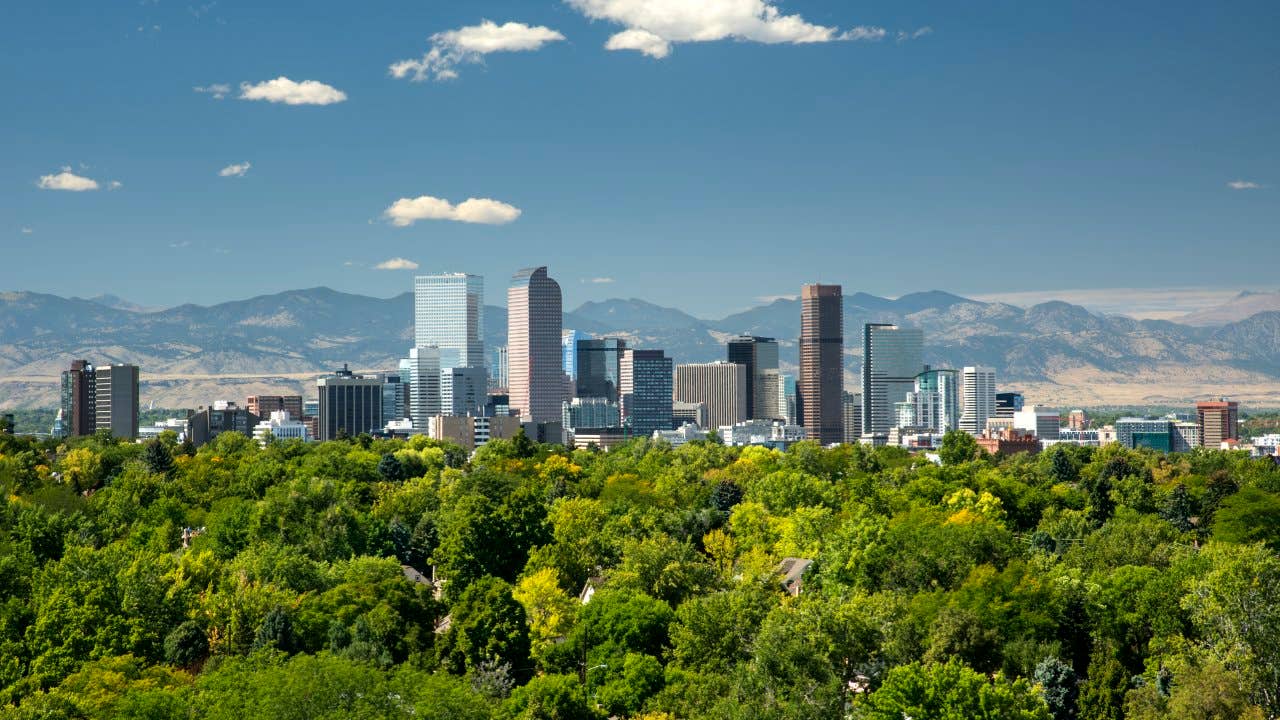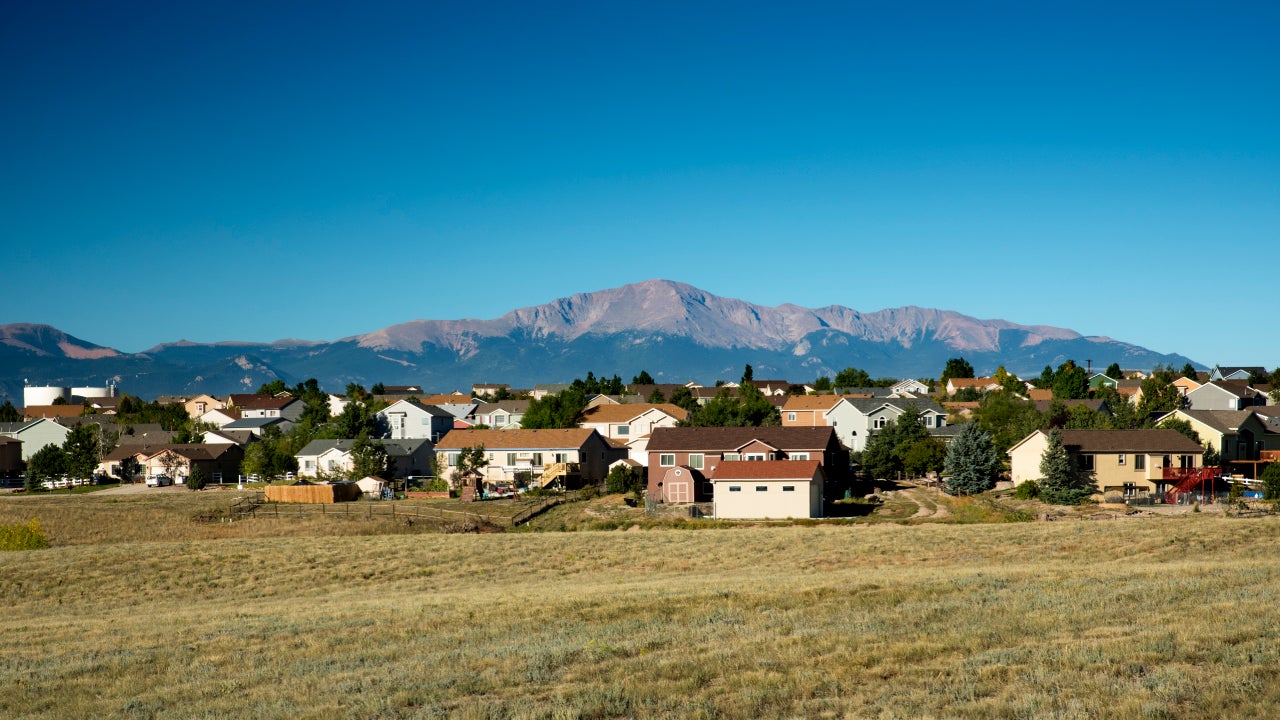Cost of living in Denver

There’s plenty to love about living in Denver — easy access to the mountains, around 300 days of sunshine per year, youthful energy and a thriving tech scene with great career opportunities. These attributes have led to a population surge here, though, and the once-affordable Mile High City now has mile-high housing prices. In fact, the cost of rent here increased by more than 45 percent between 2021 and 2022, and home prices are well above the national average.
However, the good news is that the roof over your head is the biggest barrier to affordability here. When it comes to paying for other essentials, like food and transportation, the cost of living in Denver looks far closer to the national average.
Housing costs
Over the past few years, the influx of newcomers has fueled a steep runup in Denver housing values. One study from Point2Homes, a real estate data firm, estimates that home prices in the metro area increased by more than 162 percent between 2011 and 2021. Whether you’re looking to rent or buy, be prepared for housing costs in Denver to be the biggest chunk of your budget.
Home prices
If you want to buy a house in Denver, you’re going to need a big bank account. The median sale price was $554,990 in December 2022, according to the Denver Metro Association of Realtors (DMAR). (For context, the national median price in December was $366,900.)
While the housing market here is still very competitive, there are two key positive signals for prospective buyers who can manage the current mortgage rates. First, homes are sitting on the market for longer, according to DMAR. With the typical time on the market sitting at 43 days, there’s not as much pressure to act as fast as there was during the peak of the pandemic. Second, Redfin data shows that homes have been selling for slightly less than their listing price. That’s a huge change, considering that in April 2022, the typical home sold for nearly 7 percent over listing price.
As you work toward buying a house, 2023 looks to be a year that buyers will have a bit more bargaining power. And if your new home in Denver will be your first, make sure you research first-time homebuyer programs in Colorado that might be able to ease the financial burden.
Rent prices
According to data from RentCafe, the average rent in Denver is $1,997, and the average apartment size is 841 square feet. However, if you’re willing to cast a wide net with your search, you may be able to score a better deal in certain neighborhoods. Rent is high in popular neighborhoods like Cherry Creek and LoDo, but there are more affordable options in Chaffee Hill, Regis and Westwood. While prices are still relatively high throughout the metro area, average rent actually decreased throughout the final four months of 2022 — so don’t give up on looking for a good deal.
Job market in Denver
Here’s some good news to help offset the high prices of homes in Denver: Employers pay high wages here. A recent survey from CareerBuilder showed that the average salary in Denver was $80,500 — the seventh-highest in the country. In December 2022, the unemployment rate in Denver stood at 2.8 percent. Throughout the metro area, there are loads of opportunities with big-name companies like Lockheed Martin, Kaiser Permanente, Wells Fargo and Western Union. It’s also a city of new ideas and venture capital funding: Denver ranked 23rd in the entire world on Startup Genome’s most recent rankings of tech hubs.
Food costs
Data from the U.S. Bureau of Labor Statistics shows that keeping your stomach full in Denver costs slightly less than in the rest of the country. The most recent figures show that the typical household in Denver spent 11.2 percent of its budget on food, including groceries and dining out, while the typical household in the greater U.S. spent 12.2 percent. Depending on where you’re currently living, you may wind up paying a lot less for certain items. For example, Bankrate’s cost of living calculator shows that buying a steak at a Denver grocery store is 23 percent cheaper than buying one in St. Louis.
Transportation in Denver
Denver spans more than 150 square miles, so it’s important to estimate how much you’ll pay to get around the city. This is another area where you may be able to save some cash, because this city is very pedestrian- and bike-friendly — not having a car can save you tons of cash on car insurance in Colorado.
According to Walkscore, Denver is the 16th most-walkable large city in the country, and there are 196 miles of on-street bike lanes, plus ambitious plans to build 270 additional miles of bike paths. Public transportation is also an option, as the city has a well-developed light rail system with a monthly pass available for $114.
Local and state taxes and fees
The tax man might actually be considered a friendly face in Colorado: Tax Foundation data shows that property tax rates in the state are among the lowest in the country. Per the city’s tax-assessor site, a home valued at $460,000 in 2021 (the median at the time) had an annual property tax bill of $2,385. When it comes to the taxes you’ll pay on goods and services, the combined state, local and special district sales tax rate in the metro area ranges from 2.9 percent to 9.25 percent.
Moving to Denver
If you’re thinking about relocating to Denver, welcome to the party. The city grew by more than 19 percent between 2010 and 2020, and the big-city energy combined with close proximity to the mountains continues to attract new residents. Before you start planning your next chapter in the capital of Colorado, crunch the numbers to make sure you aren’t stretching yourself too thin. Don’t forget to estimate your moving costs, too. If you’re moving from far away, you’ll need to pay for long-haul movers, which can create some mile-high costs.
It’s also wise to reach out to a local real estate agent in advance of your move for assistance in finding the right neighborhood for your lifestyle and budget. As the housing market continues to change, a Realtor is more important than ever to help you craft a compelling offer and negotiate for the best deal — giving you extra cash to enjoy your new digs in Denver.
FAQs
-
According to figures from the U.S. Census Bureau, the median household income in Denver is $78,177. (That means half the city’s residents make more than that amount, and half make less.) A recent study from CareerBuilder pegged the average salary here slightly higher at $80,500. So, keep that $80K range in mind as you negotiate with prospective employers.
-
Your monthly budget in the Mile High City will depend on a range of factors, including your neighborhood, housing situation, household size and more. According to figures from the Economic Policy Institute, a single person needs $3,796 each month to cover housing, food, transportation, taxes and other necessities. For a family of four, that monthly figure jumps to $8,501 with childcare costs as the largest line item in the budget.
-
Compared with the rest of the country, Denver is a fairly expensive place to call home — especially if you’re looking to buy a home. According to data from the Denver Metro Association of Realtors, the median sale price of a home here is more than $550,000. That’s significantly higher than the median price across the entire country, which the National Association of Realtors puts at $366,900.
Why we ask for feedback Your feedback helps us improve our content and services. It takes less than a minute to complete.
Your responses are anonymous and will only be used for improving our website.
You may also like

Cost to buy a house in North Carolina

Cost of selling a house in Colorado




